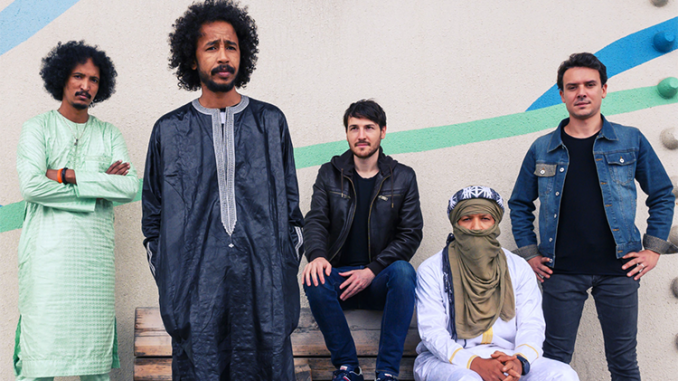
By Chris Lambie
As borders re-open and citizens return to their homelands, refugees across the globe are left to wonder if they’ll ever enjoy the same right. The shadow of al-Qaeda and Sharia law still prevents artists from the West African nation of Mali from bringing music to their people. Those who have sought sanctuary abroad, to continue their craft, play a vital role in the preservation of culture.
Award-winning group Tamikrest are one such example. Formed in Kidal in 2006, the group features musicians from Mali, Niger and Algeria. Recordings and performance have also included artists from France, Morocco and Japanese instruments. Tamikrest have taken their version of timeless Tuareg rhythms and modern sounds around the world. Their 2020 album, Tamotaït (meaning ‘Hope for positive change’) was their fifth studio recording. It featured Moroccan singer Hindi Zahra and Japanese traditional musicians. Elements of rock, blues, reggae and psychedelia shimmer and shift like the sands of their Saharan homelands.
Speaking with the aid of a translator, singer/guitarist Ousmane Ag Mossa tells me of his own musical development. “When I was really little, my first encounter with music was with the djembe; The traditional percussion instrument played by women. They sing and they clap their hands… Later, the first time I heard the acoustic guitar was really something like a revolution for me. This was with Ibrahim ag Alhabib. (Leader of iconic Tuareg band Tinariwen). It was completely new also because he was singing the reality – the modern problems of his people. It had a big echo for me.” Tamikrest take the evocative Saharan sounds further into the branches of rock, reggae, dub and ‘World Music’. Ousmane says, “Tinariwen have the same influences but the big difference between the groups is maybe the generations, almost 20 years difference in ages. Tamikrest are, of course, influenced by Tinariwen but we always tried to compose our own music but with new influences of other kinds of music, maybe Tinariwen was not listening to; for example, Pink Floyd. So, a lot of different modern artists have influences in our creativity. I don’t really like the categorisation of music and my own music – rock, blues, pop. I like to think it is universal and without frontiers. From this way of thinking, I like to bring my own music and culture in one country but also to bring back something of this country I am going to.” The results are stirring and hypnotic underlaid with a distinctive drone defying time and space. “When I compose, basically it comes from personal experience of my life that I turn into a poem… and compose the music for this poem. Then each time that I will play, even if it’s 20 years later, I will always experience the emotion of this song.”
“For my poems in Tamisheq (language), it’s essential to sing in my own language for several reasons. Of course, I feel sorry because most people don’t understand Tamisheq but they can read the translation afterwards. But during the live concerts, nobody can understand. But I will always sing in Tamisheq, because it’s a way for me to transmit the [feelings]. I can use in poems, special words which are quite rare words. I think using this word in my song, that in 50 years, some Tuareg people can hear the song and be reminded of these special words. A way for me to choose very carefully the words in [my language] in order for the Tamisheq (aka Tuareg) not to be forgotten.” The stories of political and social upheaval, war, exile and in particular, the suffering of women, are delivered with gravity. The soaring rock-influenced riffs and powerful beats however, suggest courage, vitality and hope for the future.
Looking forward to the upcoming Australian tour in trio format, Ousmane says, “We are very impatient to go for the first time to Australia.” Interpreter Alissa asks, “What will the weather be like in October?” I explain that the climate differs vastly from north to south here. While Springtime sunshine should warm their visit, I told them I’d awoken to frost outside my window that morning. A pause and then translation for Ousmane. “Oh! Ice?” Alissa exclaims. “Ohhh…kaaaay… We didn’t know that it could be cold in Australia. Incredible!”

